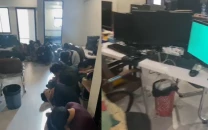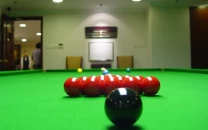Youth parliament: Youth participation termed vital for sustainability of institutions
SM Zafar urges youth parliamentarians to think about peaceful coexistence.

Youth parliament: Youth participation termed vital for sustainability of institutions. PHOTO: FILE
Excitement and ambition were palpable as the fifth batch of the Youth Parliament Pakistan (YPP) ended its session on Saturday in the federal capital.
“We had no idea how effective this exercise was going to be when we started,” said Hira Mumtaz, a YPP member from Lahore and a graduate of the Lahore University of Management Sciences (LUMS).
“It is only after we got here that we realised the importance youth can play in Pakistan’s future politics.”
The YPP, an initiative of the Pakistan Institute of Legislative Development and Transparency (PILDAT) started in 2007, is modeled after the National Assembly.
Mumtaz and her fellow youth parliamentarians said through meetings with legislators, guest speakers and their own deliberations they learned the complexities and challenges of policymaking and governance. They said that sustainability of Pakistan’s democratic institutions was not possible without the active involvement of the youth.
Rana Faisal Hayat, the 24-year-old youth prime minister of the 5th batch, who hails from Kasur, said the initiative not only trained them in tolerating opposing views but also in drawing on international best practices for legislation in high-pressure situations.
The 60-member youth parliament, with unequal representation from across Pakistan, engages in parliamentary business including debate and mock legislation in a two-party set-up.
The members are selected by a rigorous selection process, Mumtaz said, which consists of submitting a grueling application and subsequent interviews by a steering committee.
The committee, headed by Senator SM Zafar, includes former deputy speaker of the National Assembly Faisal Karim Kundi and Minister of State for Privatisation Khurram Dastgir Khan.
Zafar advised the young men and women to think about the question of peaceful coexistence.
“The challenge you are going to face is how to make Pakistan a peaceful and happy nation,” Zafar said. “In other words, the challenge is to first decide and to lead public opinion on how to treat others who do not agree with your interpretation of religion or your faith.”
He told YPP members to discover their answer through independent study and reflection.
Discussing Zafar’s message, 28-year-old YPP member Shafqat Ali from Pakpattan said he was in favour of negotiations with the Taliban but not on their terms.
“I don’t think we can resolve terrorism unless we have negotiations but we cannot bow down to their unreasonable demands,” Ali, who is a graduate student at the Bahauddin Zikriya University in Multan, said.
He said socioeconomic reforms to end poverty and unemployment could also weaken the rationale of militants.
Mumtaz, 22, who is thinking of pursuing further studies in public policy, said if young Pakistanis commit to entering politics the process was not so difficult after all.
“There were 60 of us here and we met with legislators and policymakers, so these connections will be extremely valuable for us if we decided to start our political careers,” she said.
The YPP project is supported by the Danish International Development Agency.
Published in The Express Tribune, September 23rd, 2013.


















COMMENTS
Comments are moderated and generally will be posted if they are on-topic and not abusive.
For more information, please see our Comments FAQ